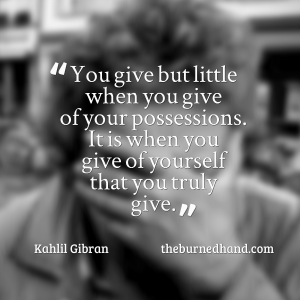You see them on the street. You grab your child’s hand and whisper “Don’t make eye contact” and you hurry by. They are on the corners with their signs and you say “I bet they make more money than I do.” They come to your churches, and the smell, oh the smell, you can’t wait for them to leave. I wonder how many people have ever sat down and talked to them. I wonder how many people ask them how they got they way and what can they do to help. I am lucky to know a few people who do that.
Over the last 15 years, I have taught mostly lower socioeconomic children. Some years past, “T” was in my class. He was special needs and perhaps got that way by his mother’s use of various drugs and/or alcohol. He had a smile that could light up a room and I loved him, as I do all my children. He was a handful to say the least and required constant, constant, attention. He would always be somewhere he was not supposed to be, and would “bother” the other children. The lady I worked with had a hard time with him as well, so she would have to take his hand when we went anywhere as a class down the hall. I had to do what is called a child study on him. We did lots and lots of paperwork and I worked with the school counselor and social workers as well as the psychologist. One day, we found out T’s mother had been evicted from where she was living. He had a sister that I knew of and I went to that teacher to find out what had happened. She knew even less.
I went to my good friend next. A man who had worked on a committee with me to try to help the teachers with behavior problems in class. He worked closely with the families and he knew of my struggles with T’s situation. We did everything in our power at that time to speed up the child study, but sadly, T was “not in our district” anymore and somehow was going to be removed from school. To this day I am still not even sure how this happened. Both administrators at the time were well aware of my work with this family. I have never seen my normally mild-mannered, doesn’t use a curse word, heart of gold friend stand up to the administration like he did the day I begged them to help me keep T at school. I told them if he wasn’t in my class, I was afraid of what was going to him. I said his child study was coming up, please let him stay until then. Somehow, it didn’t matter. That was the year I lost faith in the system. That was the year I cried and told them he had no other place to go, but they didn’t budge. That was the year I went to people above them and started letting them know what was going on.
That was the year my friend said I was right. There were some things that might be worth losing your job over. Miraculously, one of the administrators was moved to another school over the summer and no one even saw it coming. Well, there might have been a few who saw it coming. I told my friend I didn’t know how much longer I could keep doing this. I was drained. We started talking about other jobs for me, and I said I loved his job. He gave me the eyeball and said that my strengths could also be my weaknesses. I always got too close. He’s right. I do and I would probably lose my job over it or quit (true story). I have been told that over and over again in my professional career. I cared too much. To this day I still don’t believe that is possible.
If you would like to be one of the few who care too much, here are some resources for you:
Homeless Shelter Directory Currently 3,355 shelters in the U.S. on this site The food bank listings are there as well.
Veterans Affairs Department No one should be homeless that served our country. Help your community.
The National Center on Family Homelessness The National Center merged with American Institutes for Research and this site has comprehensive resources for families.
35 ways to help the Homeless One tip that was truly helpful, was to develop a list of shelters that you can hand out to the homeless on a small card. I also have bought extra gift cards to Starbucks, and have been known to hand those out. I could tape a handy list of soup kitchens to the card as well.
Lastly, I would encourage you to get to know your local shelters and food banks. We don’t know how they got there, but we can help them move on.

